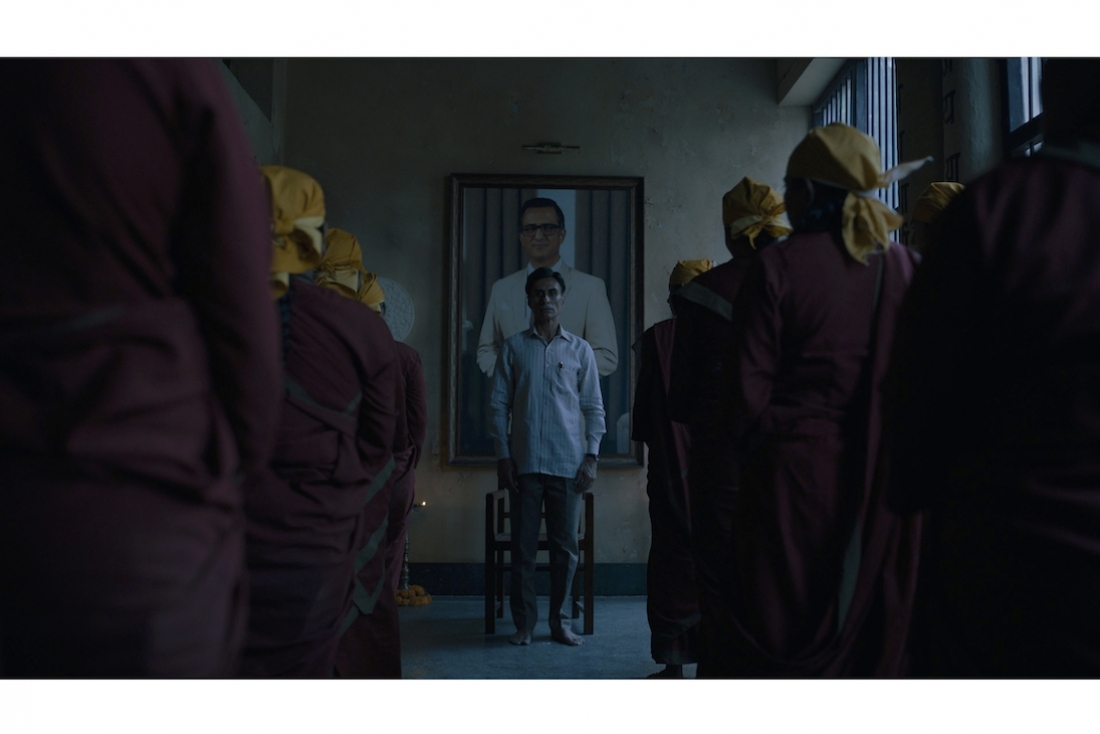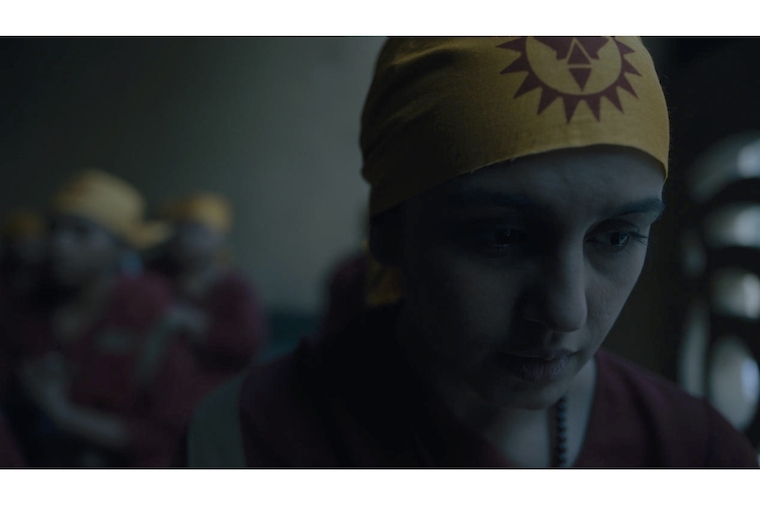
Still from Leila

Still from Leila
Deepa Mehta’s world of Cinema is rarely fictional. She speaks the truth, sometimes way ahead of its time; she may self-admittedly get frightened at the time but that does not stop her from creating cinema that is changemaking, enlightening and astonishing. She created Fire more than two decades ago, when homosexuality was illegal, let alone frowned upon. What continued to inspire her against all adversities was the collective courage of Indian women in particular and humanity at large.
As she creates the world of Leila, set in a dystopian world of Aryavarta, we wonder if the themes she touches upon really belong to an alternate anti-utopian universe, or if we already live in a world where women are prescribed to be pure, where clean water is a luxury, and where children of mixed-blood mysteriously go missing. We also see strong images of ideological tattoos, communal divisions, and an environmental disaster. Leila shows us how to preserve what is left of us in an all authoritarian world - both cinematically and otherwise.
The revolutionary Deepa Mehta lets us in on her cinematic gaze as she embarks upon the journey of the Netflix India original series co-directed by Shanker Raman and Pawan Kumar, with actors Huma Qureshi, Siddharth, Rahul Khanna among many others.

Huma Qureshi in Leila
What is your first memory of Literature and Cinema?
I grew up in Amritsar and my father was a film distributor and exhibitor, so when we were really young and they didn't quite know what to do with us, they sent us to watch a movie. So I actually grew up in a movie hall! I very distinctly remember, one of the first films that I watched and that made a huge impact on me was Mamta. It had Suchitra Sen. I loved Mamta so much that when I grew up and had a daughter I actually named her Devyani, which is inspired by one of the characters in the film. My father was amazed because he could not believe how something that I could not touch, I could not smell, could evoke such an emotion in me. Mamta really blew me away. One of the first books that I read was George Orwell’s Animal Farm and that again blew me away and even though I was really young, I knew something bad was happening in it. The words and images are so extremely interwoven by Orwell that you can almost picturise what he’s written, and that’s when I realised the power of Literature and Cinema.
How did you decide to be a filmmaker?
Actually, I didn’t want to become a filmmaker at all, because of my father. Every Friday his mood would change depending on how the film did. If he was in a bad mood we knew the film had done badly at the box office, so it was very difficult and I said to myself that this is the last thing that I ever want to do in my life. However when I was getting ready to do my PhD in Hindu Philosophy, my friends asked me to help them out in their documentary film house in Delhi called The Cinema Workshop, as their receptionist had left and they needed someone to answer their phones for a week. I agreed. But within two days they asked me to stop answering the phones because of how rude I was. Then I helped out in other fields and learned sound, editing and camera work in the space of four weeks and I fell in love with cinema again. It was a very different cinema than the hardcore stuff that my dad did. We had movie stars come to our house every weekend but this was very different. I re-started my love for cinema with documentaries. And of course because I was a failed receptionist!
How would you describe your filmmaking sensibility?
My hero is the Bengali Indian filmmaker Satyajit Ray, and everything that I’ve done in my life has been inspired by what he’s done. I remember the character Narayan from my film Water was actually inspired by Soumitra Chatterjee - everything from the way his dhoti was, his kurta, him playing the flute, and I was really lucky because I got to observe him on a set. I’m talking about the time Ray was on a wheelchair and still holding a camera, and just to observe him was so incredible. The way he spoke to actors, he just assumed that everybody he was talking to was intelligent, so there was always an innate sense of respect for performers. I learned a lot from that observation. I really like working with actors because I really do admire actors. It's so difficult to do what they do; they make themselves so vulnerable and I must confess that I learned that innate admiration from observing Ray.
What’s your process of casting?
I don’t like people sitting across the table reading lines, and judging them on the basis of that. When I met Huma (Qureshi) for the first time we were just chatting. We weren’t even talking about the character; we were talking about a common friend, about life, what we like and how she was going to Armenia for her birthday with a couple of her friends and how I’d never been to Armenia, and that for me is an actual audition because when you’re going to be working with somebody, you’d better see if you’re comfortable with them. It’s important to know if you’re on the same wavelength and if you can communicate with them because directing is all about communication and how well the actor listens or doesn’t listen.
What research went into Leila?
Leila felt like an original concept and I didn’t want it to be coloured by what it should be like, because I wasn’t trying to emulate anything. I knew what I didn’t want it to be like anything so I watched other dystopian films that I didn’t want to copy. Which, of course, I absolutely love! I told myself that this is not Children of Men, this is not a Blade Runner, this is not Fahrenheit 451, this is not 1984, this is not The Handmaid’s Tale, and that this is not even Black Mirror. Then what was left by the process of elimination was a world that was completely unexplored and that itself became the world of Leila.
How would you describe your journey from Fire to Leila, what changes have you noticed in the world of cinema and otherwise?
I am very proud of Fire. In fact, I was just talking to Nandita Das and we were discussing how we created a cult classic. It feels great to be a part of something that stands out in annals of the history of Indian cinema not just because it was a lesbian film - I won’t ever forget when they were trashing it in the movie hall Regal, and saying, ‘’there are no lesbians in India why are you showing such a movie’’, there was a protest of women all over Connaught Place that night and they were carrying placards and candles. I can still picture that one Placard which said ‘’I’m a lesbian and an Indian’’. It was mind blowing! And in that sense, I feel very proud even if at that time I was terrified. Fire was ahead of its time. I felt so proud of the courage of the Indian women at the time. And Leila feels like an inevitable part of that very same journey which is women centric, humanity centric, which is about the rights of women, and of course women can survive with dignity and perfect humanity and pride, the way Shalini does in Leila. It feels like an extension of that very same journey in a very positive and hopeful way, and I feel Leila is one of the most hopeful things that I’ve ever done. I think Leila is a journey that every human being makes or will make in their life. A journey of choice, a journey of finding dignity and humanity. That’s Leila for me.
Text Priyanshi Jain